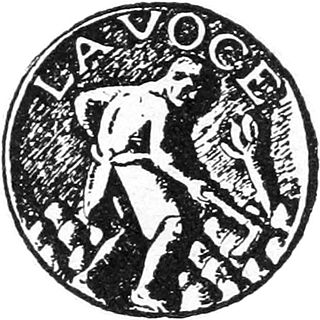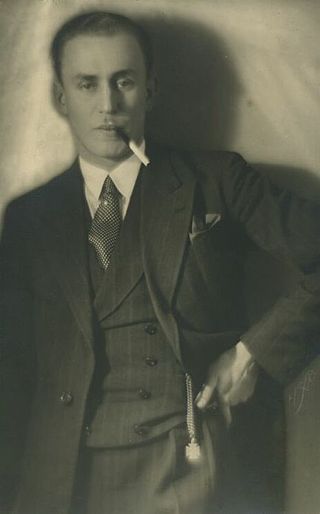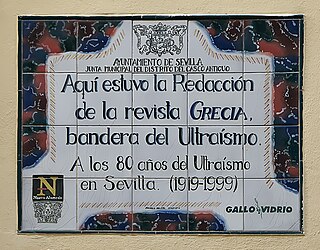Related Research Articles

In the arts and literature, the term avant-garde identifies an experimental genre or work of art, and the artist who created it, which usually is aesthetically innovative, whilst initially being ideologically unacceptable to the artistic establishment of the time. The military metaphor of an advance guard identifies the artists and writers whose innovations in style, form, and subject-matter challenge the artistic and aesthetic validity of the established forms of art and the literary traditions of their time; thus, the artists who created the anti-novel and Surrealism were ahead of their times.
Tulenkantajat was a literary group in Finland during the 1920s. Their main task was to find a way to take Finland from so-called backwoods culture to the new, modern European level of literature. They did not consider their manifestos to form a program of any sort, but instead stated that their group was the "new feeling of life", building on humility, courage, and the sense of community. The group published their own magazine Tulenkantajat. The editorial of the first issue emphasized the group's unconnectedness to any political party, if not even apoliticism. However, less than a decade later the group disbanded partly due to political conflicts, as some members ended up being strictly on the left while others openly promoted the values of the Academic Karelia Society.

Teemu Tuomas Mäki is a Finnish artist, theatre director and writer. He was born in Lapua, and was one of the first Finnish artists to gain a doctorate. In 2008–2013 he was the Professor of Fine Arts in Aalto University. Before and after that he has worked as a freelancer.
Voima may refer to:

Helvi Hämäläinen was a Finnish writer who published dozens of books of prose and poetry during her six decade writing career.

Hannu Veikko Luntiala is the former Director General of the Population Register Centre in Finland and an author for Tammi and Aviador Kustannus, both Finnish publishing companies.

Alli Hagar Olsson was a Swedish-speaking Finnish writer, literary critic, playwright and translator.
Jyrki Kiiskinen is a Finnish poet and recipient of the Eino Leino Prize in 1993 along with Jukka Koskelainen. They both edited the literary magazine Nuori Voima in the 1990s.
Jukka Koskelainen is a Finnish poet and recipient of the Eino Leino Prize in 1993 along with Jyrki Kiiskinen. They both edited the literary magazine Nuori Voima in the 1990s.

La Voce was an Italian weekly literary magazine which was published in Florence, Italy, between 1908 and 1916. The magazine is also one of the publications which contributed to the cultural basis of the early forms of Fascism. It also contributed to the development of the concept of Europeanism.
Parnasso is a literary magazine published in Helsinki, Finland. The magazine has been in circulation since 1951. It is among the most respected literary magazines in the country.
Klemen Pisk is a Slovenian poet, writer, translator and musician.

Kaarlo Sarkia was a Finnish poet and translator who was influenced by romantic poetry. His poems include motifs like childhood memories, love, landscapes and dreamworld, and in his last collection of poetry also his personal death and mankind's sufferings. Together with Uuno Kailas, Sarkia was the most prominent Finnish poet of the 1930s. As Kailas, his poetry also had homosexual themes.

Olavi Paavolainen was a Finnish writer, essayist and poet. He was one of the prominent figures of the literary group Tulenkantajat, and one of the most influential Finnish writers of the inter-war period. Paavolainen started his poetry career in the literary magazine Nuori Voima.
Annika Idström was a Finnish author, dramaturg, and translator.
Maria Cecilia Margit af Forselles is the Director of the National Library of Finland.
Prometeo was a monthly avant-garde magazine which existed between 1908 and 1912 in Madrid, Spain. The magazine was established by the avant-garde writer Javier Gómez de la Serna. Its subtitle was revista social y literaria.
Ultra was an avant-garde bilingual art and literature magazine which appeared in Finland in 1922. Its subtitle was tidskrift för ny konst och litteratur. Although it produced only eight issues, it played a significant role in the introduction of avant-garde literary approach in the region.
Tuli & Savu is a poetry magazine based in Helsinki, Finland. It has been in circulation since 1994.

Grecia was a literary magazine which was published from 1918 to 1920 in Spain. Its subtitle was Revista Decenal de Literatura. Later it was redesigned as Revista de literatura. It was a traditionalist as reflected in its title and modernist publication in the early years, but later adopted an avant-garde approach and became the flagship of the ultraísmo.
References
- 1 2 3 4 5 "Nuori Voima magazine". Nuoren Voiman Liitto. Archived from the original on 28 April 2013. Retrieved 9 April 2017.
- 1 2 3 4 Lieven Ameel (2011). "Nuoren Voiman Liitto and Nihil Interit as Cultural and Literary Transmitters in the 1990s and 2000s". In Petra Broomans; Ester Jiresch (eds.). The Invasion of Books in Peripheral Literary Fields: Transmitting Preferences and Images in Media, Networks and Translation. Groningen: Barkhuis. p. 95. ISBN 978-94-91431-06-7.
- 1 2 3 "Interview – Greek writers in Finland". Chronos. 2015. Archived from the original on 11 February 2015. Retrieved 9 April 2017.
- ↑ Harri Veivo (2019). "Trajectories, Circulations and Geographical Configurations of the Avant-Garde and Modernism in Finland, 1922–1939". In Benedikt Hjartarson; Andrea Kollnitz; Per Stounbjerg; Tania Ørum (eds.). A Cultural History of the Avant-Garde in the Nordic Countries 1925-1950. Vol. 36. Leiden: Brill Rodopi. p. 463. doi:10.1163/9789004388291_026. ISBN 978-90-04-38829-1. S2CID 193080083.
- ↑ "Finland's Foremost Advocate of Contemporary Literature". Nuoren Voiman Liitto. Archived from the original on 28 April 2013. Retrieved 9 April 2017.
- 1 2 Outi Oja (2012). "From Autofictive Poetry to the New Romanticism The Guises of Finnish Poetry in the 1990s and 2000s". In Leena Kirstinä (ed.). Nodes of Contemporary Finnish Literature. Helsinki: Finnish Literature Society. pp. 113, 131. doi:10.21435/sflit.6. ISBN 978-952-222-510-8.
- ↑ Lieven Ameel (2014). Helsinki in Early Twentieth-Century Literature. Urban Experiences in Finnish Prose Fiction 1890-1940. Helsinki: Finnish Literature Society. p. 117. doi:10.21435/sflit.8. ISBN 978-952-222-567-2.
- ↑ Hannu K. Riikonen (2016). "Reception of Futurism in Finland: Olavi Paavolainen's Writings". In Günter Berghaus (ed.). International Yearbook of Futurism Studies. Vol. 6. Berlin; Boston, MA: De Gruyter. p. 127. ISBN 978-3-11-046595-2.